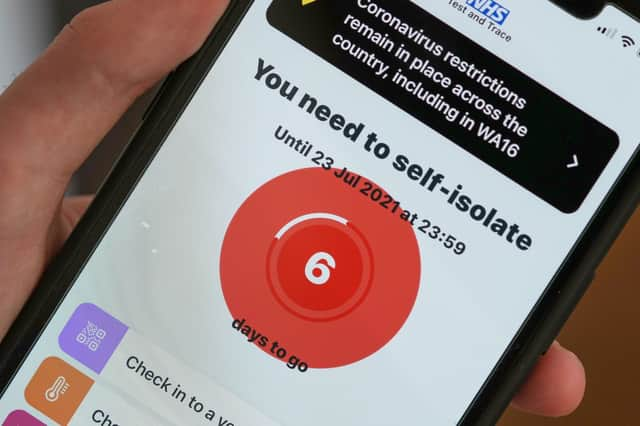NHS Covid app 'pingdemic' forces record 618,903 Brits into isolation in one week


More than 600,000 people have been forced into self-isolation in the space of one week after being ‘pinged’ by the NHS Covid-19 app.
New figures show a record 618,903 alerts were sent to app users in England and Wales in the seven days to 14 July, instructing people to isolate after being in close contact with someone who had tested positive for coronavirus.
'Pingdemic' causing chaos for workers
Advertisement
Hide AdAdvertisement
Hide AdA total of 607,486 alerts were sent to people in England, up 16.8 per cent on the 521,033 recorded in the previous week to 7 July.
In Wales, a total of 11,417 people were contacted by NHS Test and Trace to isolate in the week to 14 July, up from 9,940 in the week before.
The latest figures come as 259,265 people tested positive for Covid-19 in England at least once in the same period, marking a rise of 33 per cent on the previous week.
In the face of mounting pressure to relax self isolation rules, Business Secretary Kwasi Kwarteng has confirmed that the government will allow select industries to be exempt from quarantine.
Advertisement
Hide AdAdvertisement
Hide AdThe UK government is due to publish a list of sectors that will be exempt from coronavirus self isolation rules on Thursday (22 July) as ministers struggle to contain the “pingdemic”.
Mr Kwarteng said industries would not be expected to apply for exemption, despite No10 previously saying businesses would need to contact government departments for permission.
The Business Secretary would not “preempt” which sectors will be on the list, but warned it would be “very narrow, simply because we don’t want to get into a huge debate about who is exempt”.
The impending changes come after industry bodies from healthcare, transport, retail and manufacturing sectors warned of staff shortages caused by the app alerts, with some companies reportedly missing 20 per cent of their workforce.
Advertisement
Hide AdAdvertisement
Hide AdSupermarket shelves have been left empty due to staff shortages, with BP and Iceland forced to close some locations due to workers in quarantine.
Iceland’s managing director, Richard Walker, said the supermarket was having to hire 2,000 temporary workers to prepare for “the exponential rise in pinging”.
Trade Union Congress (TUC) general secretary Frances O’Grady said: “If we want to stop Covid spreading like wildfire through workplaces and wider society, the government must support people to self-isolate.
“With hundreds of thousands of cases reported in the past week – and over half a million people pinged – it beggars belief that ministers are still refusing to provide decent sick pay.
Advertisement
Hide AdAdvertisement
Hide Ad“The baffling decision this week to exclude millions of low-paid workers from access to any form of sick pay looks more foolish by the day.
“We know that many working in hospitality and other frontline roles do not earn enough to even qualify for the statutory minimum. They shouldn’t be forced to choose between doing the right thing and being plunged into financial hardship.
“Staff shortages will continue to get worse unless the government fixes our broken sick pay system.”
Around two million workers in the UK do not earn enough to qualify for statutory sick pay, according to TUC analysis.
Only a 'small number' of workers to be exempt
Advertisement
Hide AdAdvertisement
Hide AdBoris Johnson announced plans for a “small number” of critical workers to be able to continue working despite being ‘pinged’ to self isolate earlier this week.
He confirmed that some key workers who have received both doses of a coronavirus vaccine will be freed from quarantine rules if they are contacted by the app, but will still have to test negative for Covid-19 to be able to attend work and take daily lateral flow tests.
People who do not qualify for exemption must continue to self-isolate if contacted by the app.
On Tuesday (20 July), the Prime Minister’s official spokesman said: “It’s not a blanket exemption and my understanding is we’re not going to be producing a list covering individual sectors, these business-critical areas will be able to apply for exemptions to their host departments.”
Advertisement
Hide AdAdvertisement
Hide AdThe government now appears to have changed its course amid mounting criticism.
It is expected that a wider relaxation for all double-jabbed individuals will be introduced later, but this will not come until 16 August – almost a month after most coronavirus laws ended in England.